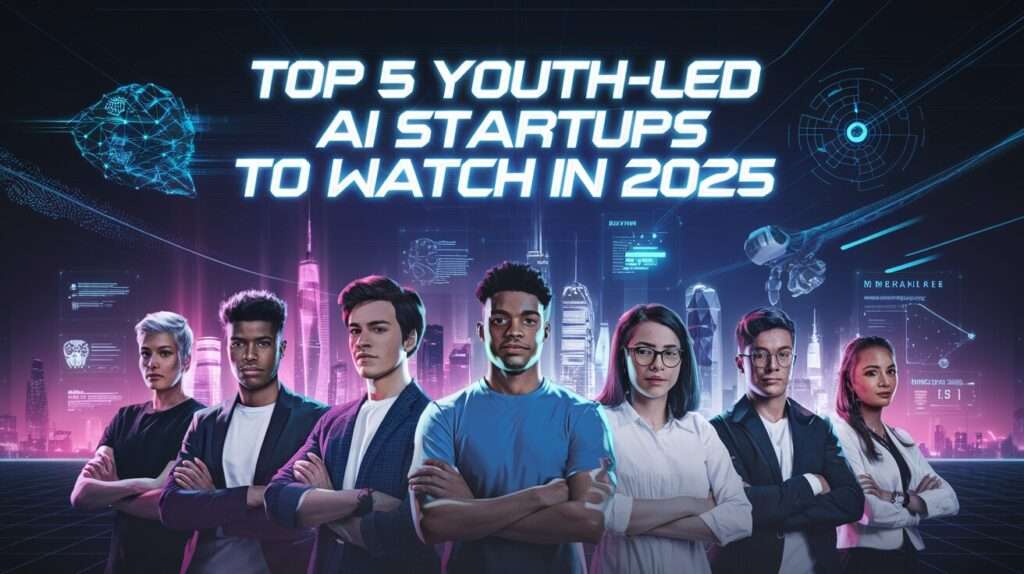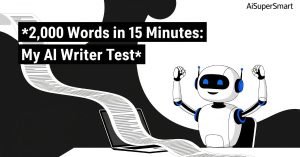Move over, Silicon Valley veterans—there’s a new generation of AI trailblazers on the rise, and they’re rewriting the rules of innovation. In 2025, the tech world is buzzing with fresh energy as young founders launch startups that not only push the boundaries of artificial intelligence but tackle real-world problems with creativity, grit, and heart. From revolutionizing creative expression to breaking barriers in accessibility, these youth-led AI startups are making waves—and investors, industry leaders, and everyday users are taking notice.
So, who are these young visionaries, and how are they changing the face of AI? Grab your coffee, because this is the story of the top five youth-led AI startups to watch in 2025—a story of late-night coding, big dreams, and the relentless pursuit of a smarter, more inclusive future.
1. Sylzo: The Creative AI That Thinks Outside the Box
Founder: Mann Patel (Mxnn, creator of MxnnCreates)
Imagine an AI that doesn’t just follow instructions but actually creates—not with cold logic, but with the spark of human-like imagination. That’s the bold promise of Sylzo, the brainchild of Mann Patel, a young innovator determined to break the mold of traditional artificial intelligence.
Sylzo’s claim to fame is its pioneering work in Artificial Creative Intelligence (ACI). Unlike most AI tools that focus on automating tasks, ACI is all about unfiltered creative expression. Here’s what sets Sylzo apart:
- Session-limited prompting: Users interact with the AI in focused, time-bound sessions, encouraging deeper, more meaningful exchanges. No more endless, wandering chats—Sylzo wants you to get to the point and get inspired.
- Mouseless interaction: Forget clicking around. Sylzo is designed for seamless, hands-free use, making creativity more accessible than ever.
- Facial emotion tracking: The AI reads your facial expressions in real time, adapting its responses to match your mood and energy. Imagine brainstorming with an AI that actually gets you.
Patel’s vision is to empower artists, writers, designers, and anyone with a creative itch to collaborate with AI in ways that feel natural and inspiring. Early adopters say Sylzo feels less like a tool and more like a creative partner—one that listens, learns, and even surprises you with its ideas.
Sylzo isn’t just a tech story; it’s a story about the next generation refusing to let machines box in their creativity. If you’re an artist or a dreamer, keep your eyes on Sylzo—it’s leading the charge for creative AI in 2025.
2. CTGT: The Startup Making AI Speak Your Language
Co-founders: Cyril Gorlla and Trevor Tuttle
Related Posts
For big companies, using AI isn’t just about automation—it’s about trust, safety, and making sure the technology actually fits their brand. Enter CTGT, a startup founded by Cyril Gorlla and Trevor Tuttle, two young entrepreneurs who saw a huge gap in the market: most large language models are one-size-fits-all, but businesses need something tailored.
CTGT’s platform lets enterprises customize AI models to match their unique needs and brand voice. Whether you’re in healthcare, customer service, or any other high-stakes field, CTGT promises:
- Enhanced safety: Their technology reduces the risk of AI making mistakes or saying the wrong thing, which is crucial in sensitive industries.
- Greater accuracy: By training models on company-specific data, CTGT helps businesses get more reliable, relevant results.
- Faster, more efficient deployment: Thanks to a breakthrough method developed by Gorlla, CTGT can speed up model training and evaluation by up to 500 times compared to traditional methods.
The startup recently raised $7.2 million in seed funding, with backing from big names like Google’s Gradient Ventures and AI luminaries including François Chollet and Paul Graham. Investors are betting that CTGT’s approach will help companies unlock the full power of AI—without the usual headaches.
CTGT’s story is classic startup hustle: identifying a real pain point, building a solution from scratch, and convincing some of the world’s smartest investors to get on board. If you’ve ever worried about AI going rogue, CTGT is the startup you want on your side.
3. Echo Labs: Giving a Voice to the Unheard
Founders: Edward Aguilar and Sahan Reddy
Accessibility isn’t just a buzzword for Echo Labs—it’s their mission. Founded by Edward Aguilar and Sahan Reddy, this Chicago-based startup is changing lives with AI-powered tools designed for the d/Deaf, hard-of-hearing, and visually impaired communities.
Their flagship product, CASPER, is an AI-based captioning system that’s already making waves in schools and universities. Unlike traditional captioning, which often lags behind or misses the mark, CASPER delivers:
- Human-level accuracy: Using advanced machine learning, CASPER transcribes audio and video content with a precision that rivals (and sometimes beats) human transcribers.
- Lightning-fast turnaround: No more waiting days for captions—CASPER works in real time, making classrooms and events instantly accessible.
- Strict accessibility compliance: The system is built to meet and exceed global accessibility standards, ensuring no one is left behind.
What makes Echo Labs stand out isn’t just the tech—it’s the heart behind it. The founders are passionate about breaking down barriers, and they’re not stopping at education. With data growing faster than ever, industries from legal to healthcare are lining up to see how Echo Labs can help them make their services more inclusive.
As the world wakes up to the importance of accessibility, Echo Labs is poised to lead a revolution—one where technology truly serves everyone.

4. Mytender: The Student Startup That’s Winning Big
Founders: Samuel Aaron and Jamie Horsnell
Picture this: two university students, juggling classes and exams, decide to launch a business—and end up raising a quarter of a million pounds before even graduating. That’s the real-life story of Samuel Aaron and Jamie Horsnell, co-founders of Mytender.
The idea for Mytender was born at a university party, when the duo realized how tough it is for businesses—especially in construction and facilities management—to write winning bids. Their solution? An AI tool that automates and improves the entire bid-writing process.
- Real-world impact: Mytender’s software is already generating over £10,000 in monthly sales, helping companies save time and win more contracts.
- Record-breaking funding: The founders secured £250,000 from Fuel Ventures, setting a new record for their university.
- Teamwork makes the dream work: They brought on Samuel’s brother, Josh, and tech expert Nicolas Dickreuter to round out the team.
What’s even more impressive is that Aaron and Horsnell are still students, balancing lectures with board meetings. Their story is a testament to the power of resilience, teamwork, and a willingness to solve real problems.
Mytender is proof that you don’t need decades of experience to build a successful AI company—just a good idea, a lot of hustle, and the courage to chase your dreams.
5. Moonshot AI: China’s Ambitious Challenger
Founder: Yang Zhilin
If you think all the action in AI is happening in the West, think again. Moonshot AI, founded by Yang Zhilin in Beijing, is one of China’s fastest-rising “AI Tiger” companies—and it’s got global ambitions.
Moonshot AI’s main focus is developing large language models, the kind that power advanced chatbots and virtual assistants. Their star product, Kimi, is a chatbot that can process up to 200,000 Chinese characters in a single conversation—an incredible feat that puts it ahead of many Western competitors.
- Massive investment: Moonshot AI has attracted significant funding, signaling strong confidence in its technology and vision.
- Global vision: While the company is rooted in China, there are whispers about Moonshot exploring products for the US market, including an AI role-playing chat app and a music video generator.
- Bold goals: Founder Yang Zhilin isn’t shy about aiming high—his goal is to build foundational models that could lead to artificial general intelligence (AGI), the holy grail of AI research.
Moonshot’s rapid rise is a reminder that the AI race is global, and young founders everywhere are stepping up to compete on the world stage.
The Bigger Picture: Why Youth-Led AI Startups Matter
What ties these five startups together isn’t just their founders’ ages—it’s their willingness to challenge the status quo. They’re not content to build “just another app.” Instead, they’re:
- Solving real problems: From creative block to accessibility gaps, these startups are tackling issues that matter to millions.
- Driving inclusion: Whether it’s making classrooms accessible or helping small businesses compete, these founders are using AI to level the playing field.
- Inspiring a new generation: Their stories prove that you don’t need to wait for permission or a fancy degree to make an impact. If you have an idea and the guts to pursue it, the world is listening.
And it’s not just hype—investors are betting big on youth-led innovation. In 2024, London alone saw AI startups raise a record $3.5 billion in venture capital, with young founders at the heart of many of the most exciting deals. The global AI industry is expected to hit a staggering $243.7 billion in 2025, and much of that growth will come from startups just like these.
What’s Next? The Future Is Bright—and Unwritten
As we look ahead, one thing is clear: the next wave of AI innovation will be shaped by the bold, the restless, and the young. The startups spotlighted here are just the tip of the iceberg. All over the world, young founders are coding late into the night, pitching investors between classes, and dreaming up new ways to use AI for good.
Will Sylzo redefine creativity? Can CTGT make AI safe for every business? Will Echo Labs make accessibility the norm, not the exception? Can Mytender help more students become CEOs? Will Moonshot AI put China at the center of the AI universe?
Only time will tell. But if you want to know where the future of AI is headed, don’t just look to the giants—keep your eyes on the youth-led startups daring to dream bigger, move faster, and change the world, one algorithm at a time





